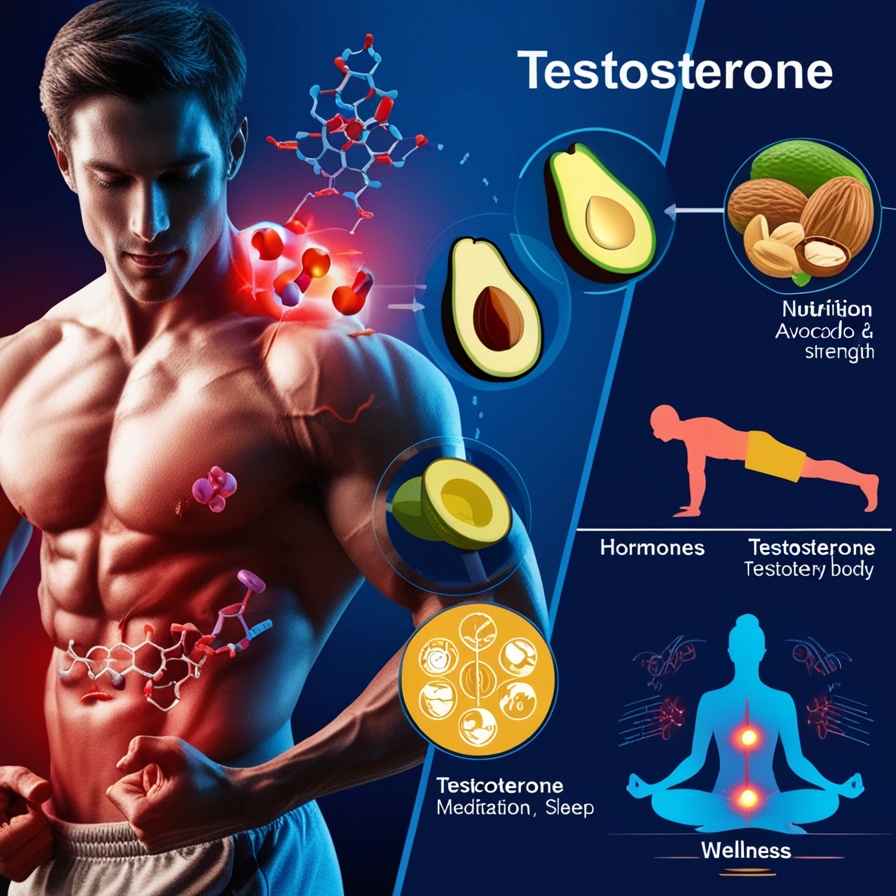Testosterone is a vital hormone that plays a crucial role in the human body, while it is often associated with men, women also produce testosterone, albeit in smaller amounts, understanding it’s importance and how to maintain healthy levels can significantly impact your overall health and well-being.
What is Testosterone?
Testosterone is a steroid hormone primarily produced in the testicles in men and the ovaries in women, with smaller amounts produced by the adrenal glands, it belongs to a class of hormones known as androgens, often referred to as male sex hormones.
Functions of Testosterone in the Body
Development of Sexual Characteristics. In men, testosterone is responsible for the development of male reproductive tissues, such as the testes and prostate, as well as secondary sexual characteristics like increased muscle and bone mass, deepening of the voice, and body hair growth.
Sex Drive and Fertility. Testosterone regulates libido (sex drive) and is essential for sperm production in men, in women, it also contributes to a healthy sex drive.
Muscle Growth and Strength. It promotes muscle protein synthesis, leading to muscle growth and improved physical performance.
Bone Health. Testosterone helps maintain bone density and reduces the risk of osteoporosis.
Mood and Energy Levels. Healthy testosterone levels contribute to a positive mood, reduced fatigue, and better mental clarity.
Red Blood Cell Production. It stimulates the production of red blood cells, which carry oxygen throughout the body.
Signs of Low Testosterone
Low testosterone, also known as hypogonadism, can manifest as.
Decreased sex drive
Fatigue or lack of energy
Loss of muscle mass
Increased body fat
Depression or mood swings
Difficulty concentrating
Reduced bone density
If you suspect low testosterone, it’s essential to consult a healthcare provider for proper diagnosis and treatment.
How to Increase Testosterone Naturally
Maintaining optimal testosterone levels involves lifestyle adjustments, dietary changes, and effective stress management, here is how you can do it.
1. Optimize Your Diet
Eating the right foods can have a profound effect on your hormone levels.
Healthy Fats. Incorporate sources of monounsaturated and polyunsaturated fats like avocados, olive oil, nuts, seeds, and fatty fish (e.g., salmon and mackerel) these fats are building blocks for hormone production.
Zinc-Rich Foods. Zinc is essential for testosterone production, add foods like shellfish, beef, pumpkin seeds, and beans to your diet.
Vitamin D. This nutrient acts as a hormone in the body, get it from fatty fish, fortified foods, or sunlight exposure.
Magnesium Sources. Foods like spinach, almonds, and dark chocolate support healthy testosterone levels.
Minimize Processed Foods. Avoid refined sugars, trans fats, and junk food, as these can disrupt hormonal balance.
2. Exercise Regularly
Physical activity, especially strength training, can naturally boost testosterone levels.
Strength Training. Compound exercises such as squats, deadlifts, and bench presses are particularly effective.
High-Intensity Interval Training (HIIT) Short bursts of intense activity followed by recovery periods can significantly increase testosterone.
Avoid Overtraining: Overexertion can increase cortisol levels, which suppress testosterone production.
3. Manage Stress
Chronic stress raises cortisol levels, which can negatively impact testosterone.
Practice stress reducing techniques like mindfulness, meditation, deep breathing, or yoga.
Take breaks during work and avoid overloading your schedule.
4. Get Quality Sleep
Sleep is when your body regenerates and produces hormones, including testosterone.
Aim for 7–9 hours of uninterrupted sleep each night.
Create a sleep friendly environment: keep the room dark, quiet, and cool.
Avoid screens and caffeine before bedtime.
5. Maintain a Healthy Weight
Excess body fat, particularly around the abdomen, is associated with lower testosterone levels.
Follow a balanced diet and regular exercise routine to achieve and maintain a healthy weight.
6. Limit Alcohol and Quit Smoking
Alcohol. Excessive alcohol consumption can impair testosterone production, moderate your intake to protect your hormonal health.
Smoking. Nicotine and other chemicals in cigarettes can disrupt hormone production and reduce testosterone.
7. Supplement Wisely (if Necessary)
Some supplements may help boost testosterone levels naturally, but always consult a healthcare provider before use.
Vitamin D. Essential for testosterone production and overall health.
Zinc and Magnesium. Support testosterone and overall hormonal balance.
Ashwagandha. An adaptogenic herb that can reduce stress and increase testosterone levels.
Fenugreek. A plant based supplement shown in some studies to support testosterone production.
8. Avoid Endocrine Disruptors
Limit exposure to chemicals found in plastics, such as BPA, phthalates, and parabens.
Use glass or stainless-steel containers for food and beverages instead of plastic.
9. Stay Sexually Active
Engaging in regular sexual activity can help maintain healthy testosterone levels and improve mood.
10. Seek Medical Advice if Needed
If lifestyle changes don’t lead to improvements, consult a healthcare professional, medical treatments like testosterone replacement therapy (TRT) may be necessary for those with clinically low levels.
Conclusion
Testosterone is a critical hormone that affects many aspects of your health, from physical performance and mood to sexual health and bone density, by adopting a healthy lifestyle, you can naturally support your testosterone levels and improve your overall well-being, if you suspect a hormonal imbalance, don’t hesitate to seek professional advice.

